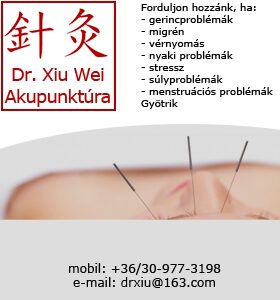Acupuncture is an alternative medicine originating in Ancient China that treats patients by insertion and manipulation of solid, generally thin needles in the body.
According to traditional Chinese medicine, bodily functions are regulated by the flow of an energy-like entity called qi. Acupuncture aims to correct imbalances in the flow of qi by stimulation of anatomical locations on or under the skin called acupuncture points, most of which are connected by channels known as meridians.[1] Scientific research has not found any physical or biological correlate of qi, meridians and acupuncture points,[2][3][4] and some contemporary practitioners needle the body without using a theoretical framework.[5][6]
Proponents of acupuncture believe that it promotes general health, relieves pain, treats infertility, and treats and prevents disease.[7] Current scientific research supports its efficacy in the relief of certain types of pain and nausea,[8][9][10] however, some systematic reviews have found these results to be equivocal.[11][12] Other reviews have concluded that positive results reported for acupuncture are too small to be of clinical relevance and may be the result of inadequate experimental blinding,[13] or can be explained by placebo effects and publication bias.[14][15] Other researchers have pointed out the difficulty in designing an adequate scientific control for any placebo effect acupuncture might have due to its invasiveness.[16][17][18] The recent development of retracting needles as a form of placebo control has resulted in a new wave of studies, the weight of evidence from which suggests acupuncture”s effects are due to placebo.[12][19]
There is general agreement that acupuncture is safe when administered by well-trained practitioners using sterile needles[20][21][22][23] but does carry small but serious risks and adverse effects including death.[10] The use of acupuncture for certain conditions has been tentatively endorsed by the United States National Institutes of Health[1] and National Center for Complementary and Alternative Medicine,[20] theNational Health Service of the United Kingdom,[24] and the World Health Organization,[25] though most of these endorsements have been criticized.
wikipedia

 Magyar
Magyar Deutsch
Deutsch
